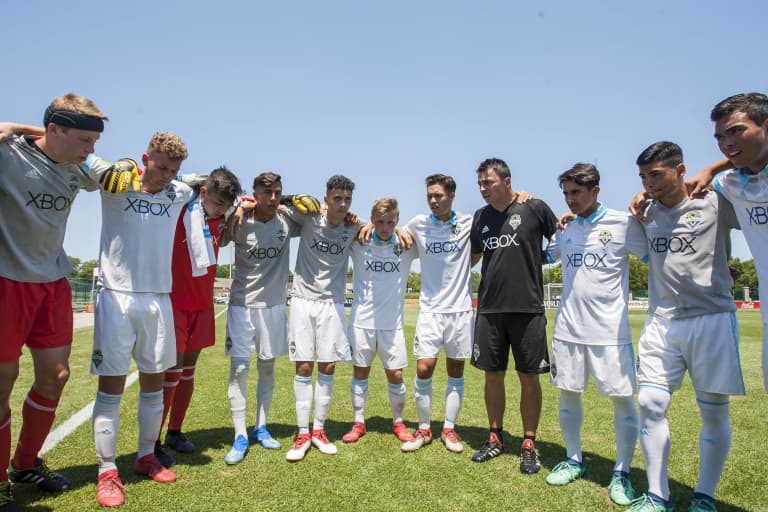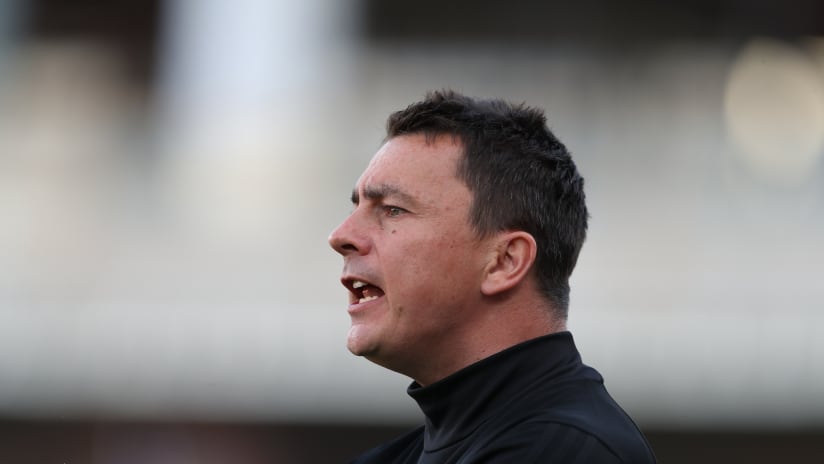One month prior to the Sounders Academy U-17s winning the U.S. Soccer Development Academy national championship, head coach Chris Little completed the Elite Formation Coaching License course. A joint venture between MLS and the French Football Federation, the EFCL is a year-long program, featuring one Academy coach from every team in the league, that aims to increase the quality of coaching education in the United States.
Little, who was named the USSDA U-17 Coach of the Year for the Western Conference, spent 12 months in pursuit of a license that every Ligue 1 and Ligue 2 academy director is required to hold. The programming for the course includes six week-long visits to MLS clubs, each focusing on a different construct, several trips to France to learn under the tutelage of FFF instructors, and a two-week visit to a European club. Each time the coaches convened for a new session, they faced peer evaluations, countless research-laden presentations and rigorous examinations.
“It was the best development opportunity that I’ve ever gotten,” said Little, who also spent two weeks with the Atletico Madrid technical staff last season. “It was all focused on the professional development of elite academy players, so it was really good to be taken out of my comfort zone and to be challenged. Everybody who has come through the course, they’ve said it’s the hardest thing they’ve ever done but also the most rewarding.”
Culminating in a ‘finals week’ that included three final presentations and three exams, the arduous, meticulous nature of the EFCL is akin to achieving a Master’s degree in the development of professional players.
The beauty of the EFCL lies in its adaptability. Recognizing the size, diversity and regional identities of the United States, the FFF instructors establish core criteria for a successful professional development system as they challenge coaches to tailor this information to the unique nature of their respective clubs.
“What the course makes you focus on and realize is who we are as the Sounders,” said Little. “What’s our identity? What’s our DNA? What are the key traits? And from that, what’s important to play that way? What’s our style? What’s our game model? And then to play within that game model, what kind of players do we need?
“This last year we spent a lot of time in the Academy creating positional profiles and what we’re looking for in scouting and recruitment. But also creating performance standards for the players. What is a good performance from a right back? Technically and tactically, what are we looking for? How can we measure that? How can the player have that awareness and ability to evaluate their own performance?”

Chris Little coached the U-17s to a USSDA title in his first season with the group. | Quinn Width
Each of the six domestic club visits were dedicated to mining the depths of key principles in the development of professional players. Topics for the week-long stays included methodology, sports science and physiology, mentality (leadership, role definition, etc.), tactics, and the establishment of clear game models.
“What’s great about this course is it took you out of that comfort zone and challenged you to look at new ideas,” said Little. “I think the biggest thing I improved on during the course is the attention to detail and just the level of expertise that is being demanded, as every part of a session can have a major influence on players.”
At the conclusion of the year-long course, the coaches were assessed on their knowledge with three finals, all of which were evaluated by a panel of French Federation technical staff.
The first focused on a principle of play within a club’s game model. Little focused on combination play, diving deep on the intricate tactics and patterns his team looks for in the final third. His second presentation explored evidence-based coaching and how the Sounders have implemented it throughout the Academy, while the third was a report on his visit to Atletico Madrid.
With his presentations complete, Little then had to pass a written exam, testing his comprehension of the course’s pedagogy and methodology, and conduct training sessions that were evaluated by the FFF instructors.
While the course was extremely rigorous and demanding, Little believes that programs like the EFCL will unlock the United States’ potential on the global stage.
“I think MLS has had massive growth in the last 5-10 years in terms of resources, infrastructure, investment in academies,” he said. “What I think they’ve done really well is they’ve invested in people. By doing that, you start to get a lot of people that can impact a lot of players. The more people that we have that are qualified and educated at a high level, hopefully there are more elite environments across MLS that give us the capacity to produce better players.”
The principles of the EFCL have permeated throughout Sounders Academy, with both Marc Nicholls and Sean Henderson having already completed the course. As the Sounders continue to invest in the grassroots game through Club Partnerships, Sounders Discovery Program and curriculum sharing, its impact will grow exponentially.





